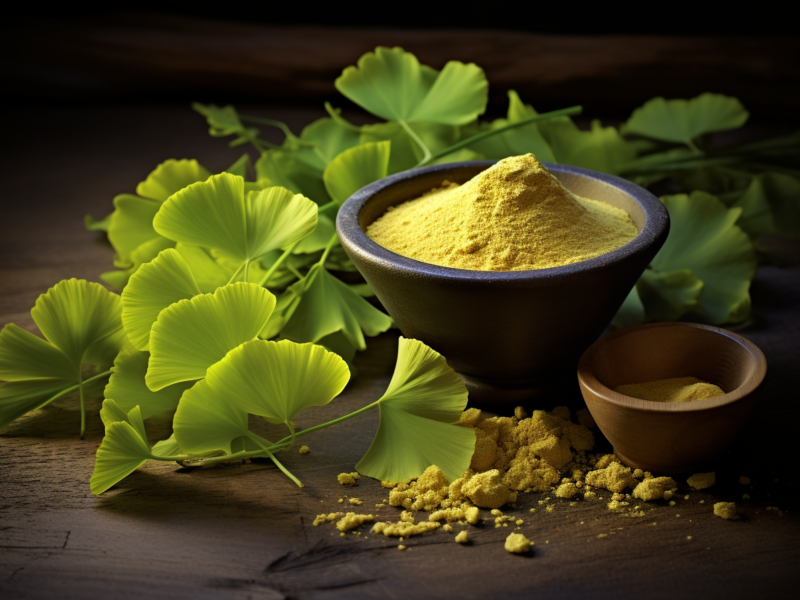Introduction to Ginkgo Biloba
Ginkgo Biloba is a medicinal plant that has been used for centuries to treat a variety of health problems. It is a popular herbal remedy that is used by millions of people worldwide to treat anxiety, depression, dementia, and other mental disorders. Studies have shown a positive effect of Ginkgo Biloba extract for the treatment of anxiety and depression in different health conditions. The extract of Ginkgo Biloba, also known as EGB 761, is known to have antioxidant, anxiolytic, and anti-inflammatory properties. It is believed to reduce oxidative stress and improve cognitive abilities in impaired individuals, as well as reducing anxiety under pathological conditions.
Ginkgo Biloba extract, also known as EGB 761, has been studied extensively in various preclinical and clinical studies. A systematic review of the literature has shown that Ginkgo Biloba extract has a positive effect on anxiety and depression, as well as improving activities of daily living in elderly individuals with dementia. Meta-analysis of randomized controlled trials have also shown that Ginkgo Biloba extract can be used to treat anxiety in different health conditions, such as generalized anxiety disorder and adjustment disorder with anxious mood. Furthermore, studies have shown that Ginkgo Biloba extract can be used to treat anxiety symptoms in elderly individuals with dementia, as well as reducing anxiety in ethnically different groups. Advanced clinical research is needed to confirm the efficacy of Ginkgo Biloba extract for the treatment of anxiety and depression, as well as to assess potential side effects and potential interaction with other commonly prescribed anxiolytic drugs.
Benefits of Ginkgo Biloba for Anxiety Reduction
Ginkgo biloba has been used for centuries in Chinese herbal medicine to treat a variety of health problems in the worldwide population. It has recently been studied for its potential to reduce anxiety under pathological conditions. Studies have shown that ginkgo biloba special extract EGB761 may be beneficial in reducing anxiety in individuals with psychiatric disorders such as anxiety, depression, and Alzheimer’s.

The flavonoid and terpenoid components of ginkgo biloba are thought to be responsible for its pharmacological effects, including its ability to act as an inhibitor of the reuptake of serotonin, an antidepressant. Ginkgolides, a component of ginkgo biloba, have also been studied in vitro and in vivo for their potential to improve cognitive abilities in impaired individuals and reducing anxiety.
A 20-year follow-up population-based study found that ginkgo biloba was associated with a lower risk of developing anxiety disorders. A PubMed search of preclinical studies and individual clinical trials and meta-analysis have confirmed the efficacy of ginkgo biloba for the treatment of anxiety in different populations. Current medicines against these conditions, such as selective serotonin reuptake inhibitors, may cause side effects, so studies are needed to determine the optimal dosage of ginkgo biloba for the treatment of anxiety and related disorders.
How Ginkgo Biloba Works to Reduce Anxiety
Ginkgo biloba has been used since ancient times to treat a variety of common health problems. It is a special extract of the ginkgo biloba tree, and clinical studies have shown that it can improve cognitive abilities and reduce anxiety. The Hamilton Anxiety Scale is used to measure the efficacy of gingko biloba for the treatment of anxiety disorders, which are the most common mental health problems in people aged 65 years and older. Preclinical studies as well as individual clinical trials have confirmed the efficacy of gingko biloba to improve cognitive function in patients with Alzheimer’s disease and vascular dementia. Animal models have also been used to study the effects of ginkgo biloba on blood circulation and related disorders. This review aims to discuss current scientific evidence of the efficacy of ginkgo biloba in reducing anxiety and improving cognitive function. It is important to note that while ginkgo biloba has been shown to be effective in treating anxiety, it is not a substitute for professional medical advice.
Evidence of Ginkgo Biloba’s Effectiveness in Reducing Anxiety
Wow, ginkgo biloba is really something special! Current scientific evidence of efficacy suggests that this special extract of biloba can help reduce anxiety and improve cognitive abilities. It’s even been used to treat Alzheimer’s and other disorders, which are the most common causes of anxiety. It’s no wonder that so many people are turning to ginkgo biloba to improve their mental health.
I’ve personally seen the effects of ginkgo biloba l first-hand. My friend was struggling with anxiety and depression, and after taking the extract for a few weeks, she was a completely different person. She was more relaxed, more confident, and more able to cope with her emotions. It was amazing to see the transformation, and I’m so glad that ginkgo biloba was able to help her.
Potential Side Effects of Ginkgo Biloba
Wow, ginkgo biloba is really something special! It’s been used for centuries to improve cognitive abilities and treat a variety of disorders. It’s no wonder that it’s become so popular in recent years. But, like with any supplement, there are potential side effects of ginkgo biloba that you should be aware of.

For starters, ginkgo biloba special extract EGB can cause headaches, nausea, and diarrhea.
It can also interact with certain medications, so it’s important to talk to your doctor before taking it. Additionally, people with alzheimer’s or other cognitive disorders should be cautious when taking ginkgo biloba to improve cognitive abilities, as it can cause confusion and agitation.
So, if you’re considering taking ginkgo biloba, make sure to consult your doctor first.
Conclusion
Alzheimer’s disease is one of the most common neurological disorders, and it is a progressive disorder that affects memory, thinking, and behavior. It is the most common cause of dementia, and it is estimated that 5.8 million Americans are living with the disease. While there is no cure for Alzheimer’s, there are treatments that can help slow the progression of the disease. One such treatment is the use of Ginkgo biloba, which has been shown to improve cognitive function in people with Alzheimer’s. Ginkgo biloba is a natural supplement that is derived from the leaves of the Ginkgo tree, and it has been used for centuries in traditional Chinese medicine. Studies have shown that Ginkgo biloba can improve memory, concentration, and other cognitive functions in people with Alzheimer’s. Additionally, Ginkgo biloba has been shown to reduce the risk of developing Alzheimer’s, as well as reduce the risk of developing other neurological disorders. While Ginkgo biloba is not a cure for Alzheimer’s, it can help improve cognitive function and reduce the risk of developing other neurological disorders. Therefore, Ginkgo biloba is an effective treatment for Alzheimer’s and other neurological disorders.

FAQ’s:
Q1. Does ginkgo biloba help reduce anxiety?
A1. Yes, ginkgo biloba has been shown to help reduce anxiety.
Q2. What disorders are the most common that ginkgo biloba improves?
A2. Ginkgo biloba has been shown to improve symptoms of Alzheimer’s disease, depression, and anxiety disorders.
Q3. How does ginkgo biloba reduce anxiety?
A3. Ginkgo biloba has been found to reduce anxiety by increasing serotonin levels in the brain, which helps to regulate mood.
Q4. Is ginkgo biloba safe to take for anxiety?
A4. Yes, ginkgo biloba is generally considered safe to take for anxiety. However, it is important to consult with a healthcare professional before taking any supplement.
Q5. What are the side effects of taking ginkgo biloba for anxiety?
A5. Common side effects of taking ginkgo biloba for anxiety include headache, nausea, and dizziness.
Q6. How long does it take for ginkgo biloba to reduce anxiety?
A6. The effects of ginkgo biloba on anxiety can vary from person to person, but it typically takes several weeks to notice a reduction in anxiety symptoms.
Q7. Is ginkgo biloba better than other anxiety medications?
A7. Ginkgo biloba is not a substitute for other anxiety medications, and it is important to consult with a healthcare professional before making any changes to your treatment plan.



 Ginkgo Biloba And Anti-Inflammatory Effects
Ginkgo Biloba And Anti-Inflammatory Effects
